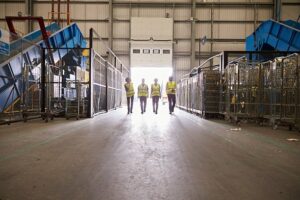Recycling is converting materials that would normally be discarded into new products. It reduces waste and conserves resources, which helps to protect the environment.
Besides the obvious environmental benefits of recycling, it also saves money. Using a lot of energy and raw materials to make new products can be costly, so recycling can help save both time and money.
1. It saves natural resources
A recycling depot SA is a vital part of the environment. It saves natural resources, reduces pollution and creates jobs.
 A recycling depot collects recyclables, such as empty bottles and cans, glass, paper, metals and other products, and transports them to a recovery facility. There, they are sorted, cleaned and processed into new materials that can be used to produce different items and goods.
A recycling depot collects recyclables, such as empty bottles and cans, glass, paper, metals and other products, and transports them to a recovery facility. There, they are sorted, cleaned and processed into new materials that can be used to produce different items and goods.
Recycling-based manufacturing conserves the world’s limited supplies of these resources by using recycled materials instead of raw materials, such as trees, metal ores and minerals. It also reduces the need for mining and drilling, which emit air and water pollutants and cause global climate change.
Another important benefit of a recycling depot is that it saves energy. It uses significantly less energy to manufacture a product using recycled products than it produces the same product from virgin materials.
For example, a ton of recycled aluminium conserves about 21,000 kilowatt hours of energy needed to extract, mine, ship and refine the same amount of virgin bauxite ore.
Recycled steel also saves about 60% of production energy, recycled plastics about 70% and recycled newspaper about 40%.
In addition, recycling-based products require about 97% less mining waste and about 40% less water than producing the same item from fresh raw materials.
Finally, a recycling depot saves energy by reducing the need to burn fossil fuels to power factories and vehicles. It saves energy otherwise consumed by burning oil, coal and other natural fuels.
A recycling depot is also important because it helps the environment by decreasing the number of landfill sites. Landfills are dangerous for the environment because they can contaminate water and soil. It can lead to leachate and other pollution problems that affect drinking water quality.
2. It reduces pollution
Recycling is a way of turning materials that would otherwise become waste into valuable resources. It reduces the amount of waste that goes to landfills and incinerators and helps keep pollutants out of the environment.
Besides helping the environment, it also saves money and reduces energy consumption. It is because recycled goods are less expensive than products made from virgin materials.
Recycled products are a great alternative to new ones and can be found in many stores. People must recycle because it can help save the earth from pollution and make the world better for future generations.
In addition, it is important to remember that recycling doesn’t always have positive environmental impacts. For example, some recycling processes produce high pollution levels in the air, soil and water. In India and China, for example, recycling electrical and electronic equipment often results in dangerous levels of toxic chemicals.
The environmental impact of recycling can vary depending on the type of material and the energy used in the manufacturing process. For example, using recycled aluminium instead of raw materials produces much less energy than creating new aluminium from scratch.
It also saves energy by reducing the need to burn fossil fuels to generate power for the manufacturing process. It reduces greenhouse gas emissions and other air pollution.
Another way recycling reduces pollution is by reducing the need for mining and extracting raw materials. For example, if all the countries in the world recycled aluminium twice as much as they do now, more than a million tons of pollutants would be kept out of the atmosphere.
3. It saves energy
Using recycled materials saves a lot of energy in the production process. It is because it requires less energy to create new usable materials than to extract raw materials from the Earth, process them and produce them from scratch.
Recycling a ton of paper, for example, saves about 70 percent of the energy needed to make it from scratch. It is a huge saving for our planet and is just one of the many benefits of recycling.
The process of recycling also diverts waste from landfill sites, thereby reducing the amount of pollution released into the environment when it’s thrown away. It is especially important in areas with waterways, where plastic often ends up in the water and can contaminate the surrounding environment.
In addition, many communities have disposal bans and mandatory recycling laws to encourage people to recycle their appliances instead of throwing them out. It helps conserve natural resources and reduces pollution, saving energy.
It is a good thing for our planet but also a good thing for you and your family. Whether you’re just beginning to recycle or are an experienced eco-warrior, recycling is easy and can greatly impact your community and the world.
The first step is putting all your recyclables in your recycling bins. You’ll want to ensure they are clean and free of food or liquid residue. Otherwise, they may contaminate other materials in your bin and be rejected by the sort line. Lastly, you’ll want to ensure your containers are marked with their specifications. It will help the workers at the sorting line to quickly identify them and ensure that they are processed properly.
